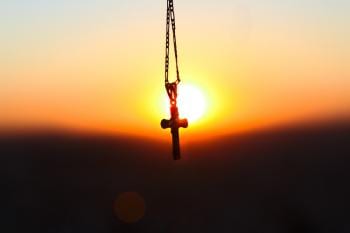
The call came on a perfectly ordinary evening in March. Dinner was on the stove. My younger son was doing his homework at the kitchen counter. I was about to set the table. Then, I picked up the phone and my doctor said, “I’m sorry, it’s breast cancer.” Five words cleaved my world, my life, and my family’s life in two, into the time before and what would come after. In my moment of dread and fear of a disease that I’d carried with me since I was fifteen, I gave the Lord a stern talking to, Come on! Wasn’t once in a lifetime enough?
I didn’t smoke. I exercised. I ate a healthy diet. I went to church. I volunteered in my community. My husband and I had been married for twenty-four years. We had children, one in college, one in high school, and one in fifth grade. They needed me—the family list maker, planner, and organizer. I was a good person. What could you be thinking, Dear Lord?
As the news resonated through my mind, body, and soul, I demanded an explanation. I wanted to know why the all-loving, infinitely merciful God in whom I believed, would allow cancer to plague me for the second time in my life. Though I railed and cried, I knew that God had nothing to do with my cancer diagnosis, and my existence as a self-described good person wasn’t going to save me from a second bout with the disease. It didn’t work for Job, and it wouldn’t work for me. Cancer, like many of life’s challenges and suffering, just happens, and most of the time, we don’t know why.
So perhaps, the question to ask when faced with one of these cleaving moments isn’t why, but how do we get through?
As I loaded the dishwasher after my family and I had dinner on that evening almost five years ago, I stared into the kitchen’s darkened window at the reflection of a flickering candle and wondered, How would I hold on to the light?
And, in the silence of my kitchen, I realized that to face down all of cancer’s uncertainty, I would lean hard on my family, on my friends, and, most importantly, on my faith. My faith, and the faith of so many others, would light the darkness and guide me through. I knew my pastor, my faith community, and my family and friends’ faith communities would storm the heavens.
I took great comfort in knowing that my oncologist, a devout Muslim, prayed for his patients daily. And during many long, sleepless, and dark nights, my mother’s rosary never left my hands as the litany of prayers brought me peace, eased my pain and fear, and allowed me to rest.
From time to time during my year of cancer treatment, particularly at moments when I felt physically awful, emotionally down, or was desperately trying to keep life “normal,” something would happen and remind me that God was with me even when I couldn’t see. For example, one misty, grey morning while I was walking my dog, a neighbor whom I hadn’t seen for some months stopped to chat. She took one look at me—bald under my baseball cap—and knew. Immediately, she offered meals, housecleaning, laundry, and grocery shopping. I kept insisting that I was “fine” and didn’t need help. She put her hand on my shoulder, told me to stop, and said that people wanted to help me because it made them feel good. Later that day, I received a gift from my neighbor—a guardian angel necklace. I wore that necklace to remind me to be open to others’ help, to walk more humbly with my God.
Once I started saying, “yes,” the more grace I received. Grace arrived at my door with meals and flowers. Grace showed up in cards and letters, in wraps and blankets, and in funny texts sent by friends and family on my infusion days. It came in the form of company at the hospital. Once treatment ended, however, the cocoon of care in which I’d been wrapped began to fall away. I had to emerge into this new life as a survivor, and I was filled with worry and unease.
Would it come back?
What would I do then?
I saw my oncologist for periodic checkups and asked whether what I felt was normal. He told me it was and reminded me not to worry about “that which was not in my hands.” Easier said than done. But, over time, I’ve accepted that I will live with some fear about cancer for the rest of my life. But that’s okay. I’m learning every day how to live in peace with the undesirable, like a global pandemic, for example. I accept that I cannot control what’s going on. I can only control my reaction to any given situation.
And, I try to do that, some days more successfully than others, through the lens of my faith. I read scripture daily. I pray a lot. I search for the small moments of beauty in creation and happiness in my gorgeous ordinary life. I meditate at the end of each day. I remind myself as we go through day after day of this upside world to hold on to hope and to let go of fear. God, in His infinite mercy, brought me to this day. Why would He not continue to walk with me?
So to answer the question, how do we get through? We get through with faith. If we have faith, we will have the strength to walk our journey. If we have faith, we will live with hope. If we have faith, we will know God’s love.
Christine Shields Corrigan, a two-time cancer survivor, wife, and mom, gives voice to the beautiful ordinary in her lyrical and practical essays. Her work about family, illness, writing, and resilient survivorship has appeared in a number of outlets. A graduate of Manhattan College and Fordham University School of Law, Chris teaches creative nonfiction writing for an adult education program, provides writing workshops for cancer support groups, and serves on the programming committee of the Morristown Festival of Books.


